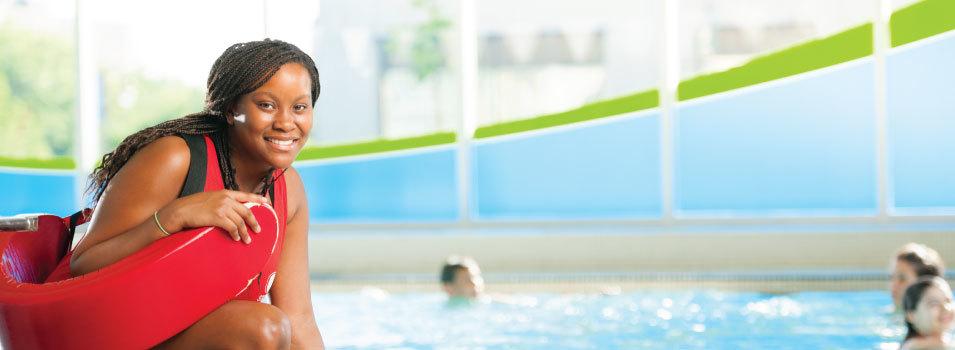About Lifeguard Training
Because lifeguards are entrusted with such responsibilities, it is crucial that they go through a rigorous life-saving training period to prepare them for future tasks. Many times a lifeguard will already have mastered skills like swimming, first aid, and CPR before the official training begins. There is often a great emphasis on the swimming population's swimming ability because it is one of the most challenging and important skills.
During the lifeguard training, a lifeguard candidate will not only sharpen your response in first aid and CPR skills but also learn about rescue skills and protocol, such as the drowning chain.
The beverage chain is often remembered by the acronym ILLL.
ILLL means:
Inability to cope
Lack of education
Lack of protection
Lack of security advice
Lack of supervision
Inability to handle: Many times the average baths will have limited experience on the beach and the sea. Because of this, this "average bath" is extremely susceptible to water hazards such as scratch currents and drowning. When you are in a water hazard, like a rip stream, an inexperienced beach enthusiast will panic and therefore not be able to cope with this environment.

Lack of education: the people most vulnerable to the beach are those who lack experience in a marine environment. Because they lack experience, they will not be able to identify dangerous hazards in the sea. As a result, this inexperienced swimmer will inadvertently put himself in dangerous positions.
Lack of protection: A very common factor in aquatic rescue and drowning is the lack of protection. This may include a lack of proper swimwear and flotation devices to protect the swimmer from hazards.
Lack of safety advice: In the absence of water personnel, such as lifeguards, the public is in danger of the dangers of the beach and the sea. Without a rescue line that controls how safe places to swim are, the public is at extreme risk for possible hazards at sea.
Lack of oversight: Often, the public overestimates their ability to swim, and as a result, they will feel able to swim unattended. Unfortunately, in most cases, this is a big mistake. Without the lifeguard for proper monitoring of swimmers, the public runs a great risk of drowning.
It is the lifeguard's responsibility to constantly strive to eliminate these factors that cause drowning.
During lifeguard training, potential lifeguards will learn valuable skills that will allow them to combat these factors causing drowning.
Although lifeguards' training will be difficult, it will train the potential lifeguards to succeed and save lives in beaches, pools, and lakes.
 Because lifeguards are often the first to respond to medical emergencies in aquatic environments, it is important that Lifeguard certification is equipped with training and equipment to provide an appropriate response. This medical training may include a full EMS training or basic first aid training, depending on the lifeguard environment to which the lifeguard is assigned.
Because lifeguards are often the first to respond to medical emergencies in aquatic environments, it is important that Lifeguard certification is equipped with training and equipment to provide an appropriate response. This medical training may include a full EMS training or basic first aid training, depending on the lifeguard environment to which the lifeguard is assigned.
Along with life-saving skills, lifesaving training will initiate discipline and the importance of hard work.
This intense lifeguard training will prepare the lifeguards for the next challenges they face.
During the lifeguard training, a lifeguard candidate will not only sharpen your response in first aid and CPR skills but also learn about rescue skills and protocol, such as the drowning chain.
The beverage chain is often remembered by the acronym ILLL.
ILLL means:
Inability to cope
Lack of education
Lack of protection
Lack of security advice
Lack of supervision
Inability to handle: Many times the average baths will have limited experience on the beach and the sea. Because of this, this "average bath" is extremely susceptible to water hazards such as scratch currents and drowning. When you are in a water hazard, like a rip stream, an inexperienced beach enthusiast will panic and therefore not be able to cope with this environment.

Lack of education: the people most vulnerable to the beach are those who lack experience in a marine environment. Because they lack experience, they will not be able to identify dangerous hazards in the sea. As a result, this inexperienced swimmer will inadvertently put himself in dangerous positions.
Lack of protection: A very common factor in aquatic rescue and drowning is the lack of protection. This may include a lack of proper swimwear and flotation devices to protect the swimmer from hazards.
Lack of safety advice: In the absence of water personnel, such as lifeguards, the public is in danger of the dangers of the beach and the sea. Without a rescue line that controls how safe places to swim are, the public is at extreme risk for possible hazards at sea.
Lack of oversight: Often, the public overestimates their ability to swim, and as a result, they will feel able to swim unattended. Unfortunately, in most cases, this is a big mistake. Without the lifeguard for proper monitoring of swimmers, the public runs a great risk of drowning.
It is the lifeguard's responsibility to constantly strive to eliminate these factors that cause drowning.
During lifeguard training, potential lifeguards will learn valuable skills that will allow them to combat these factors causing drowning.
Although lifeguards' training will be difficult, it will train the potential lifeguards to succeed and save lives in beaches, pools, and lakes.

Along with life-saving skills, lifesaving training will initiate discipline and the importance of hard work.
This intense lifeguard training will prepare the lifeguards for the next challenges they face.
Comments
Post a Comment